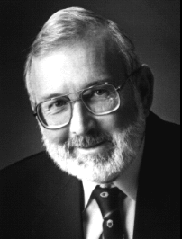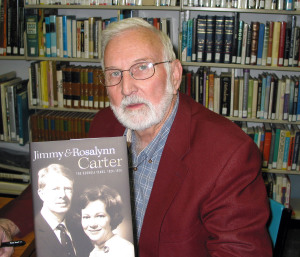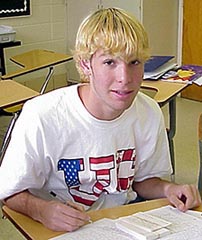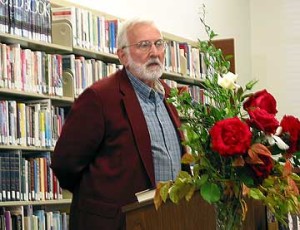Major Works
- Jimmy and Rosalynn Carter: A Biography (2010)
- Confederate Colonel and Cherokee Chief: The Life of William Holland Thomas (1990)
- Christopher Gadsen and the American Revolution (1982) with Robert H. Woody
- Ellen Glasgow and the Woman Within (1972)
E. Stanly Godbold: A Biography
by Alexandre Man-Bourdon (SHS) 2000
E. Stanly Godbold, Jr., currently lives in Starkville, Mississippi, but he was born on March 15, 1942, to Edward Stanly and Louise Godbold in Rembert, South Carolina (Kinsman 188). He lived in Rembert for eighteen years until he went to college (Godbold 1). He attended Duke University for undergraduate work and graduate work, receiving a Ph.D. from Duke. Godbold’s mentor at Duke University was Rob Woody (Godbold 1). Godbold later received a degree in theology from Southern Methodist University in Dallas, Texas (Godbold 2). He became an assistant professor of history in 1969 at the University of Tennessee in Chattanooga and later, in 1970, became the assistant professor of history at Valdosta State College (Kinsman 188). Godbold is considered an expert in the areas of the Old South, New South, and American Religion (Brown 2). He once held a grant to study Religion and Politics in the Western World at Princeton in 1987 (Godbold 2). Since 1977 he has taught in the history department at Mississippi State.
Godbold’s favorite author is William Faulkner. According to Godbold, “he (Faulkner) captures the drama of the human spirit’s interaction with history better than anyone else I know.” The most influential writer in Godbold’s life was Charles Dickens. Godbold also enjoys the work of Larry McMurtry, especially Lonesome Dove.
Godbold wrote Confederate Colonel and Cherokee Chief: The Life of William Holland Thomas in 1990,Christopher Gadsen and the American Revolution in 1982, and Ellen Glasgow: the Woman Within in 1972 (Kinsman 188). His 1990 book The Life of William Holland Thomas won the 1991 Thomas Wolfe Literary Award (Brown 2). Godbold is soon to complete a biography on former president Jimmy Carter (Godbold 1). He has published an article in the Georgia Literary Journal about Jimmy Carter’s poetry. He thinks Jimmy Carter’s best book is Turning Point, his account of the 1962 contested race for the Georgia State Senate. Godbold became interested in Jimmy Carter as a writer, then attempted to write a full biography. He started the book in 1990 on a sabbatical and did most of his research in the Carter Presidential Library in Atlanta, Georgia. He also did some work in the Georgia State Archives (Godbold 2). Godbold also received information from former head of the CIA Stance Field Turner, and former Speaker of the House Tip O’Neil. In 1994, Godbold interviewed former president Jimmy Carter (Beede 1). Recently, Godbold received a research grant at the Gerald R. Ford Library in Michigan (Godbold 2). All the information he has acquired could fill twenty file drawers.
Godbold thinks Jimmy Carter deserves a Nobel Prize for his 1978 Camp David Accords. Godbold has been working on this biography for ten years (Godbold 1). He plans to be finished in 2002 (Beede 3). According to Beede, Godbold may receive a Pulitzer Prize for his biography (1).
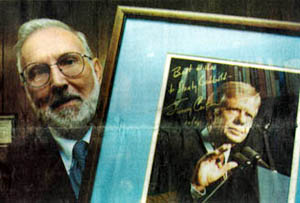
Stanley Godbold holds personally autographed photo of Jimmy Carter. Photo by Brian Allen Loden/SDN, October, 2002.
Godbold says that living in Mississippi has had very little influence on his writing, but the faculty position he currently holds in the history department at Mississippi State University often provides rewards and encouragement for his work. He says that Mississippi is a good laboratory because he knows Southern history, and he writes biographies of Southerners (Godbold 2), including the late Pulitzer Prize-winning journalist Hodding Carter Jr. of Greenville. He also has written about Virginia novelist Ellen Glasgow and edited a special spring issue of The Mississippi Quarterly devoted to her life and work. He was the first at Mississippi State to be named Humanities Faculty Member of the Year, an award given by the Mississippi Humanities Council.
Godbold is a member of the American Historical Association, the Organization of American Historians, the Southern Historical Society, and the the Mississippi Historical Society (Godbold 2). He is also a member of the Ellen Glasgow Society because of his biography of her (Godbold 1).
Stanly Godbold’s advice for young authors is to concentrate on getting a good basic education. He says, ” Decide what you want to do and stick with it, do not waste time, have a plan to earn a living and to be a productive member of your family.” (Godbold 2)
UPDATE: 2014
E. Stanly Godbold was a faculty member at Mississippi State University from 1977 until his retirement in 2003. He continues his work on Jimmy Carter and is currently at work on the second of two volumes on the presidency of Jimmy Carter. The project has included interviews with many members of the Carter White House including the former president and first lady.
Reviews
A Review of Confederate Colonel and Cherokee Chief: The Life of William Holland Thomas
by Alexandre Man-Bourdon (SHS)
Confederate Colonel and Cherokee Chief: The Life of William Holland Thomas by Stanly Godbold is the biography of William Holland Thomas. Thomas was born on February 5, 1805. His father died before he was born, so he was raised by his mother and the local Indians. Thomas was befriended by the Cherokee Indians at an early age and learned their culture and language. He was named Little Will by Chief Yonaguska. He launched several businesses, but most of these failed. Thomas learned to be a lawyer from his uncle and soon became the legal representative of the local Indian tribe. During the Civil War, Thomas became a strict colonel in the Confederate Army. Thomas was regarded by the Indians as a prophet who was sent to help them regain their native ritual lands. He was later named chief of a small tribe of Cherokee Indians. Thomas died in May of 1893.
The biography is well researched and contains the key elements of creative writing. It is surprising to see a well written underlayer beneath the overwhelming load of well researched and documented facts.
The book received the 1991 Thomas Wolfe Literary Award.
Interview with Stanly Godbold (2000)
by Alexandre Man-Bourdon (SHS)
Where did you live most of your life?
I grew up in Rembert, SC – lived there for 18 years. I have been in Starkville for 23 years –arrived here on Aug.16, 1977 – the day Elvis Presley died!
Who is your favorite author?
William Faulkner – he captures the drama of the human spirit and its interaction with history better than anyone else I know. I also like Larry McMurtry a whole lot – especially Lonesome Dove.
Who has influenced you and your writing the most?
Difficult to say, but I suppose I was influenced by my youthful reading of Charles Dickens. I’ve always been interested in writing, and writing history and biography satisfies that interest My mentor at Duke, Robert H. Woody may have had a great influence on my style, but a writer’s style tends to be personal no matter who influenced him.
How long has it taken you to write your books?
An average of ten years per book. Since they are history books; I spend many years in archives researching primary sources. The Carter book will take a few years longer than that.
Besides the Thomas Wolfe Literary Award, have you won any other awards?
A few teaching awards, and some research grants – the most recent from the Gerald R. Ford Library in Michigan. I once held a grant to study Religion and Politics in the Western World at Princeton, which I did way back in 1987.
Do you have any advice for young authors and writers?
Concentrate on getting a good, basic general education. Learn the rules of grammar, punctuation, and style. (Strunk and White’s The Elements of Style is always a good guide). Decide what you want to do and stick with it. Do not waste time. Have a plan to earn a living and to be a productive member of your family and society.
How has living in Mississippi influenced your writing?
Probably very little because I had already begun my career before I came here. The faculty position I hold, however, does provide me with time, encouragement, and occasionally even some reward for my work. Since I teach Southern history and write biographies of southerners; MS is always a good laboratory.
Could you please tell me about where you went to college and where you have taught?
I went to college (through the Ph. D.) at Duke University in Durham, NC. I also have a theology degree from Southern Methodist University in Dallas, Texas. I have taught at the Univ. of Tennessee at Chattanooga; Valdosta State University (GA), and here since 1977.
Are you a member of any associations?
Yes; The Ellen Glasgow Society (my first book was a biography of her), the Southern Historical Association, and the Historical Society, the Mississippi Historical Society, and others.
Why did you choose to write about Jimmy Carter?
I got interested in Jimmy Carter as a writer and branched out from that to attempting a complete biography I think JC’s best book is Turning Point, his account of his 1962 contested race for the Georgia state senate. He also has a fine volume of poetry entitled Always a Reckoning and Other Poems. The only article I have published about him is about his poetry and is in a Georgia literary journal.
How do you feel about a possible Nobel Prize?
I think JC has deserved it since 1978 when he mediated the Camp David Accords. Although he gets nominated every year (I even wrote a letter for him myself one time), I don’t think his chances of winning now are very good There is too much politics involved, and also, as head of the most powerful state in the world, JC had to make military decisions that his opponents could easily use against him if they chose. I think he would have been a better choice than many of the recent winners.
Has living in Mississippi and working at MSU helped you write your book about Jimmy Carter?
See my answer above. I have done most of my research in the Carter Presidential Library in Atlanta and the Georgia State Archives, also in Atlanta. I do have student research assistants here and get much help from our university library. I started the book during a sabbatical I had here in 1990.
Related Websites
- In 1994, Godbold received a faculty teaching award.
- Godbold was the first at MSU to receive Mississippi Humanities Council Award.
- Godbold appeared in two episodes of American Experience discussing Jimmy Carter on PBS in 1988.
- Description of Confederate Colonel and Cherokee Chief: The Life of William Holland Thomas on the University of Tennessee Press.
- William and Mary Review reviews Christopher Gadsen by E. Stanly Godbold and Robert Woody.
- The Virginia Magazine provides info on Ellen Glasgow and the Woman Within.
Bibliography
- Beede, Anne Marie, “History Professor writes bio on Jimmy Carter,” Clarion Ledger. No date.
- Brown, Chris. “Alumni Association honors five with 1994 Faculty Awards.” http://msuinfo.ur.msstate.edu/msu_memo/1994/4-28-94/awards.htm, Aug-21-1998.
- Godbold, Stanly. Reply-To: Interview. [Online]Available e~mail:canadada@hotmail~com from esg~ra.msstate.edu. April 18, 2000.
- Henderson, Chad. “Godbold receives humanities honor. Available http://msuinfo.ur.msstate.edu/alumnus/spring.96/04godbol.htm. Aug-21-1997.
- Kinsman, Claire D., and Mary Anne Tennenhouse, eds.”GODBOLD E(dward) Stanly, Jr. 1942-.” Contemporary Authors. Volumes 37-40. Detroit: Gale Research Company, 1973.188.

